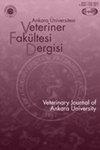Cutaneous clear cell adnexal carcinoma in two dogs: cytological and immunohistochemical evaluation
IF 0.9
4区 农林科学
Q3 VETERINARY SCIENCES
引用次数: 0
Abstract
In this study, cases of cutaneous clear cell adnexal carcinoma were diagnosed on the right forepaw of a 6-year-old female dog and on the right hind paw of an 8-year-old male dog. On the cytological examination, scattered cell groups were seen on the hemorrhagic background, whose cytoplasmic borders could hardly be distinguished. Although the cells showed marked pleomorphism but were generally oval, round, or spindle-shaped. Anisokaryosis, karyomegaly, and one or more prominent nucleoli were noted in the nuclei. Pseudoinclusions were found in some cell nuclei. Histologically, it was centrally necrotic, expansive growth consisting of lobular areas in the dermis. The neoplastic cells consisted of oval round-shaped epithelioid cells with clear cytoplasm showing marked anisocytosis, anisorkaryosis and karyomegally. Nuclei were oval or round in shape with prominent nucleoli. Cystic changes and calcified areas in layers (psammoma bodies) were noted in these areas. Few mitoses were found. In the immunohistochemical examination, tumor cells were positive for vimentin, S-100, MART1 (Melan A), and cytokeratin (MNF116) and negative for glial fibrillary acidic protein (GFAP) and smooth muscle actin (SMA). Based on these findings and results, the tumors were diagnosed as canine clear cell adnexal carcinoma. According to the literature review, this is the first case in which we found psammoma bodies and nuclear pseudo inclusions on microscopic examination of canine cutaneous clear cell adnexal carcinoma.2例犬皮肤透明细胞附件癌:细胞学和免疫组织化学评价
在本研究中,我们在一只6岁的母狗的右前爪和一只8岁的公狗的右后爪上诊断出了皮肤透明细胞附件癌。细胞学检查,出血背景可见分散的细胞群,细胞质边界难以区分。细胞虽有明显的多形性,但一般呈卵圆形或梭形。核内可见异核症、核增大、一个或多个核仁。在一些细胞核中发现假包涵体。组织学上,中心坏死,真皮小叶区扩张生长。肿瘤细胞由卵圆形上皮样细胞组成,细胞质清晰,呈明显的细胞增生、异核症和核肥大。细胞核呈椭圆形或圆形,核仁突出。这些区域可见囊性改变和层状钙化区(沙粒体)。很少发现有丝分裂。免疫组化检查,肿瘤细胞vimentin、S-100、MART1 (Melan A)、细胞角蛋白(MNF116)阳性,胶质纤维酸性蛋白(GFAP)、平滑肌肌动蛋白(SMA)阴性。根据这些发现和结果,诊断为犬附件透明细胞癌。根据文献回顾,这是我们第一次在犬皮肤透明细胞附件癌的显微镜检查中发现沙粒体和核伪包涵体。
本文章由计算机程序翻译,如有差异,请以英文原文为准。
求助全文
约1分钟内获得全文
求助全文
来源期刊
CiteScore
1.50
自引率
0.00%
发文量
44
审稿时长
6-12 weeks
期刊介绍:
Ankara Üniversitesi Veteriner Fakültesi Dergisi is one of the journals’ of Ankara University, which is the first well-established university in the Republic of Turkey. Research articles, short communications, case reports, letter to editor and invited review articles are published on all aspects of veterinary medicine and animal science. The journal is published on a quarterly since 1954 and indexing in Science Citation Index-Expanded (SCI-Exp) since April 2007.

 求助内容:
求助内容: 应助结果提醒方式:
应助结果提醒方式:


